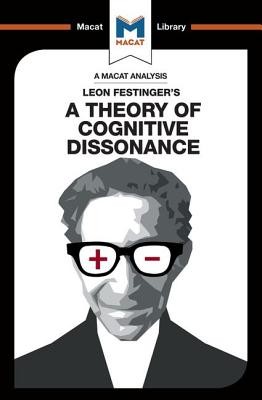
- We will send in 10–14 business days.
- Author: Camille Morvan
- Publisher: Macat Library
- ISBN-10: 1912127814
- ISBN-13: 9781912127818
- Format: 12.9 x 19.8 x 0.5 cm, minkšti viršeliai
- Language: English
- SAVE -10% with code: EXTRA
An Analysis of Leon Festinger's A Theory of Cognitive Dissonance (e-book) (used book) | bookbook.eu
Reviews
Description
Leon Festinger's 1957 A Theory of Cognitive Dissonance is a key text in the history of psychology - one that made its author one of the most influential social psychologists of his time. It is also a prime example of how creative thinking and problem solving skills can come together to produce work that changes the way people look at questions for good.
Strong creative thinkers are able to look at things from a new perspective, often to the point of challenging the very frames in which those around them see things. Festinger was such a creative thinker, leading what came to be known as the "cognitive revolution" in social psychology. When Festinger was carrying out his research, the dominant school of thought - behaviorism - focused on outward behaviors and their effects. Festinger, however, turned his attention elsewhere, looking at "cognition: " the mental processes behind behaviors. In the case of "cognitive dissonance", for example, he hypothesized that apparently incomprehensible or illogical behaviors might be caused by a cognitive drive away from dissonance, or internal contradiction. This perspective, however, raised a problem: how to examine and test out cognitive processes. Festinger's book records the results of the psychological experiments he designed to solve that problem. The results helped prove the existence for what is now a fundamental theory in social psychology.
- Author: Camille Morvan
- Publisher: Macat Library
- ISBN-10: 1912127814
- ISBN-13: 9781912127818
- Format: 12.9 x 19.8 x 0.5 cm, minkšti viršeliai
- Language: English English
Leon Festinger's 1957 A Theory of Cognitive Dissonance is a key text in the history of psychology - one that made its author one of the most influential social psychologists of his time. It is also a prime example of how creative thinking and problem solving skills can come together to produce work that changes the way people look at questions for good.
Strong creative thinkers are able to look at things from a new perspective, often to the point of challenging the very frames in which those around them see things. Festinger was such a creative thinker, leading what came to be known as the "cognitive revolution" in social psychology. When Festinger was carrying out his research, the dominant school of thought - behaviorism - focused on outward behaviors and their effects. Festinger, however, turned his attention elsewhere, looking at "cognition: " the mental processes behind behaviors. In the case of "cognitive dissonance", for example, he hypothesized that apparently incomprehensible or illogical behaviors might be caused by a cognitive drive away from dissonance, or internal contradiction. This perspective, however, raised a problem: how to examine and test out cognitive processes. Festinger's book records the results of the psychological experiments he designed to solve that problem. The results helped prove the existence for what is now a fundamental theory in social psychology.


Reviews